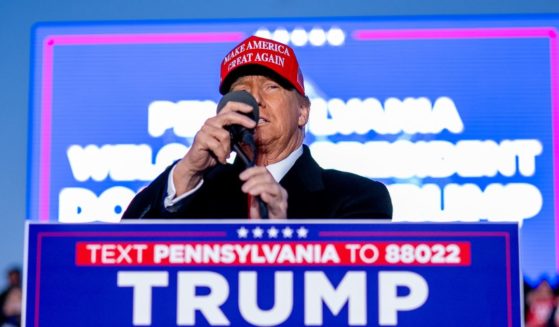Michigan GOP grabs more power before Democrats take office
LANSING, Mich. (AP) — Michigan Republicans voted early Friday to toughen rules for ballot drives and to give themselves the authority to intervene in court cases, capping a contentious post-election legislative session that critics blasted as diluting the power of voters and incoming Democratic officeholders.
The GOP-controlled Legislature sent the bills to Gov. Rick Snyder toward the end of a marathon 22 hours of voting. Bleary-eyed lawmakers also passed a $1.3 billion budget measure and backed the legalization of online gambling.
It was the final chance to enact laws before Democratic Gov.-elect Gretchen Whitmer takes over for the term-limited Snyder on Jan. 1. Snyder, a Republican, has not said whether he will sign the measures that would restrict ballot initiatives or let the Legislature automatically enter legal cases, a power that is now reserved for the state attorney general.
The ballot bill followed voters’ passage of three Democratic-backed proposals last month and Republicans’ unprecedented tactic, enacted by Snyder last week , to weaken minimum wage and paid sick time laws that began as ballot initiatives. Sweeping new laws in Republican-controlled Wisconsin will weaken incoming Democrats there. North Carolina lawmakers took similar steps two years ago.
In Michigan, groups currently need hundreds of thousands of valid voter signatures to qualify proposals for a statewide vote, and the signatures can come from anywhere in Michigan. One bill would allow no more than 15 percent of signatures from any one of the state’s 14 congressional districts. That would dilute the ability to circulate petitions primarily in more heavily populated Democratic-leaning areas, though conservatives who have led major initiatives also oppose the measure.
“This legislation is nothing more than a power grab meant to undermine the will of the voters,” said Sen. Steve Bieda, a Warren Democrat.
Democratic Sen. Morris Hood III of Detroit said the 15 percent requirement would strip “a person’s opportunity to express how they feel through a ballot initiative.”
Republicans and the business community defended the legislation, saying voters from more parts of the state should provide input on proposals before they go to the ballot. They argue that initiatives too often are funded by out-of-state interests who pay circulators.
“We think it should be grassroots,” said Senate Majority Leader Arlan Meekhof. “It shouldn’t be just one geographic area that has a problem and they want to foist their idea or concern on the rest of the state.”
The bill empowering the Legislature to intervene in lawsuits was criticized by opponents as an attempt to undercut Dana Nessel, who will be the state’s first Democratic attorney general in 16 years. Nessel has said she may not defend state laws she believes are unconstitutional.
Republicans contend that the legislation would ensure that the legislative branch has a voice as more laws are challenged in the courts. Currently, only the attorney general can automatically intervene in cases.
Nessel’s transition spokeswoman said the proposal was never properly vetted and warned it would have a “disastrous impact.” Former Michigan Attorney General Frank Kelley, a Democrat who served for 37 years, issued a statement saying the bill is unconstitutional.
“It would be an appalling abuse of power by the governor to sign the intervention bill,” he said. “He would go down in history as being against constitutional government.”
Meekhof pointed to Nessel’s past comments as a reason the Legislature needed to act.
“We made the laws. She has to uphold them and enforce them. And if she’s not going to do that that, we need to defend that for the citizens that elected us because we made those laws for the citizens,” he said.
Legislators also passed bills that would guide clerks on seeing through a voter-approved ballot initiative to expand voting options. Proposal 3 was enacted last month and allows citizens to register to vote by mail closer to Election Day — 15 days or more out — and “in person” at any time, including on Election Day.
The legislation would limit in-person registration to the local clerk’s office. Democrats said 15 of the 16 states with same-day voter registration allow it in precinct locations or at satellite clerk offices.
“It is a disservice to every Michigander to rush through these changes without regard for the consequences,” said Rep. Vanessa Guerra of Saginaw, who said residents of large cities like Detroit would have just one place to register in person within two weeks of an election.
Republicans countered, arguing that authorizing registration at polling places would make lines longer. They also questioned the need for satellite offices because another part of Proposal 3 requires people to be automatically registered to vote when they conduct business with the secretary of state regarding a driver’s license. They estimated that 95 percent of voting-age adults already are registered.
“I don’t buy that as being unreasonable if you’re registering on the same day” as an election, House Elections and Ethics Committee Chairman Aaron Miller of Sturgis said of using a clerk’s office.
One bill pending on Snyder’s desk could hamper his successor. It would make it harder for Whitmer to set environmental and other regulations that are tougher than those mandated by the federal government. He vetoed a similar measure seven years ago.
Michigan Republicans this week dropped an attempt to strip power from the incoming Democratic secretary of state. That bill was seen by many as the most explicit bid to dilute a Democrat’s authority. GOP legislators also backed away from a bill that would have shaped how Secretary of State-elect Jocelyn Benson implements a new voter-approved law that establishes an independent redistricting commission to draw congressional and legislative maps instead of the partisan Legislature. But they sent Snyder legislation that would block any future attempts to force the disclosure of donors to nonprofits, including political groups whose sway has grown in elections.
___
Follow David Eggert on Twitter at https://twitter.com/DavidEggert00 His work can be found at https://apnews.com/search/David%20Eggert .
The Western Journal has not reviewed this Associated Press story prior to publication. Therefore, it may contain editorial bias or may in some other way not meet our normal editorial standards. It is provided to our readers as a service from The Western Journal.
Truth and Accuracy
We are committed to truth and accuracy in all of our journalism. Read our editorial standards.












